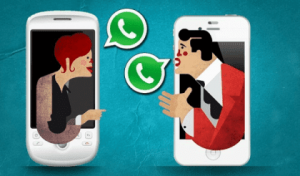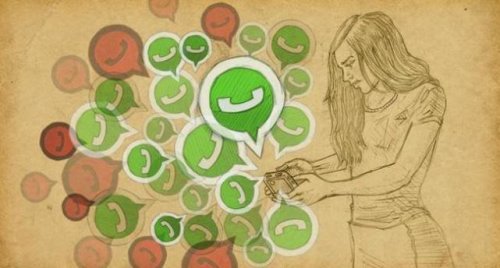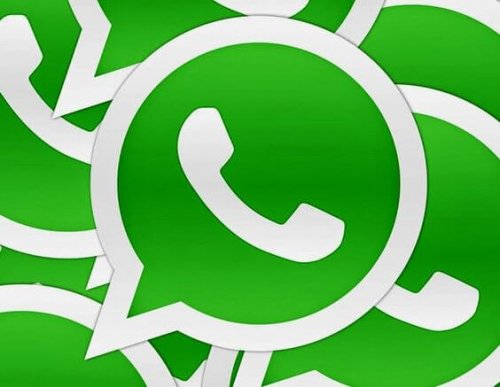The WhatsApp Couple: Messaging in Relationships


Written and verified by the psychologist Valeria Sabater
Messages that say “Good morning, I miss you” or “How is your day going?” are simple gestures that enrich our romantic relationships. However, the surge of messaging in relationships and the dependence on the double blue tick can sometimes lead to extreme situations. In particular, it can lead to absolute control and misunderstandings that can lead to conflicts.
A recent study published in the journal Computers in Human Behavior revealed just how much our relationships are changing. In this study, they asked Americans between the ages of eighteen and forty-five about the importance of messaging services in their day-to-day life. Specifically, they asked about messaging in relationships. The results couldn’t be more conclusive. The use of messaging services is key to every relationship and a measuring tool of their quality.
Messaging is an indispensable form of communication for most of us. In particular, we use this tool to communicate with our family, colleagues, and friends. We also use it with our romantic partners. The immediate responses and the closeness it creates strengthens relationships that are in the early stages. However, things seem to get complicated when we strengthen our relationship bond and reach that stage of spending more time with each other.
Messaging services can enrich or completely destroy relationships. Additionally, according to experts, how we use our cell phones and the way we relate through them also reflects how we are in relationships.

Messaging in relationships: How does it affect us?
Text messages are delicately intimate but distant at the same time. In addition to strengthening relationships, they can give us a loving impulse during those moments of the day when we need them the most. Furthermore, they can enrich the bond with our romantic partner.
However, there’s an inevitable catch. Couple therapists are seeing a rising phenomenon. Namely, they’re realizing that messaging in relationships is often a double-edged sword.
Many of our disagreements and problems stem from that hyper-connectivity that surrounds us. Digital communication tools have a curious trait. Specifically, they’re mirrors that reflect our authentic personality. Through them, we channel our fears and obsessions.
To understand this better, all we have to do is reflect on all those ways in which messaging services affect our relationship.
Social networks, as well as the use of messaging services, are channels where we unconsciously reflect our insecurities. Consequently, they lead to cognitive reactions such as jealousy, suspicion, and obsessive thoughts.
Ways in which messaging interferes in relationships
- Constant contact. At the beginning of a relationship, we probably send our partner messages every half hour. However, it’s very likely that at some point it’ll be impossible to maintain this flow of communication. When this happens, one of the two partners may start to become suspicious, panic, and wonder if something is wrong.
- Our patience is tested. With the rise of messaging in relationships, our bonds are put to the test. Namely, with that famous double blue tick that appears after our partner has read our message. Leaving a message unanswered after you’ve read it can arouse suspicion and frustration.
- Who are they online with? Seeing that our partner is online with someone that isn’t us can create awkward and conflicting situations. In fact, some people stop being productive altogether in their jobs due to the fact that they’re constantly checking if their partner is online.
- Messaging services aren’t good effective communication channels. Despite popular belief, these apps can cause constant miscommunication. Miscommunication doesn’t happen as frequently when we talk face to face. This is because we can decipher our partner’s basic non-verbal communication face to face.
- Passive-aggressive behaviors. Messaging services are the perfect places to manifest passive-aggressive behaviors. There are many studies that support this fact. For instance, manipulation, either through harassment or by disconnecting, is a common and immature behavior that can lead to painful situations.

When we carry our love in our pocket
The fact that we have a cell phone or computer doesn’t mean we make good use of it, especially when it comes to using messaging services such as WhatsApp. We carry our partners in our pockets. Love is portable in the twenty-first century, and we don’t always make good use of it.
Therefore, the new technologies or constant advances aren’t at fault. We’re the ones at fault because we don’t advance in tune with these fabulous resources that, after all, exist to make our lives easier.
Nowadays, messaging in relationships exposes our insecurities. Furthermore, it can make jealousy a weapon of mass destruction through messages, voice notes, and emojis.

We should try to avoid these situations by educating young people better. Above all, we should try to make this resource an enriching mechanism for our relationships by starting with ourselves. We can do this by managing our emotions, trusting our partner, and understanding that authentic communication, the most satisfying type, is the one that we do face to face and not through an app.
This text is provided for informational purposes only and does not replace consultation with a professional. If in doubt, consult your specialist.








